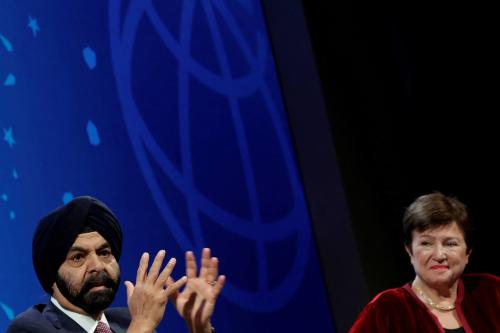In less than two weeks after the G-20 leaders met in Pittsburgh, Istanbul hosted the annual meetings of the International Monetary Fund and the World Bank. Both meetings were considered “historic”—occurring after the worst global economic crisis in recent times. The themes discussed were courageous and appropriate: harmonization of macroeconomic policies to correct global imbalances (with the IMF at the center of the process), significant shifts of voting power to emerging countries, reform of the global reserve system, capital increases for the multilateral development banks, a tax on the worldwide financial sector to help fund future rescues… So how do these two meetings relate to each other and how much action is likely to follow?
It is true that there was nothing of major significance in the International Monetary and Finance Committee (IMFC) and Development Committee communiqués that was not already mentioned in the G-20 communiqué. That should not be surprising. But the G-20 is an informal grouping of systemically-important countries that can deliberate and propose. It cannot decide in a way that binds the international community as a whole. Therefore, the acceptance of the G-20 proposals by the formal governing bodies of the Bretton Woods Institutions is an important and necessary step following the London and Pittsburgh Summits. Informal governance cannot replace formal and legitimate governance, and implementation requires multilateral actions within the framework of the international institutions.
When the leaders in Pittsburgh declared the G-20 to be the “premier forum for international economic cooperation” it was a historical breakthrough, ending the role that had been played by the G7. It does not, however, end the need for deep reform in the governance of the international institutions themselves nor does it guarantee that the proposed mechanisms for international policy cooperation will function. The Pittsburgh Summit was a success. The final communiqué was much more substantive than many had expected. It also marked the beginning of a new era with a new U.S. administration that is willing to engage and recognize the potential benefits of cooperative solutions. Moreover, the major dynamic developing economies have firmly gained a seat at the table. But in terms of implementation, everything lies ahead and is linked to real, concrete progress that has to be made within the framework of the Bretton Woods Institutions.
There was not enough time between Pittsburgh and Istanbul to move ahead with implementation. The direction is pretty clear but the pace of change remains a huge problem. The provision of sufficient and stigma-free precautionary finance by the IMF cannot be delinked from the governance issue. What does it really mean to “shift …quota share to dynamic emerging markets and developing countries of at least 5 percent from over-represented countries to under-represented countries using the current quota formula” as the basis to work from? The current quota formula is highly problematic because the dimensions relating to openness and volatility bias the quotas toward mainly European countries. Even apart from that, does it really make sense to continue to treat intra-Eurozone trade as international trade? To implement real change, the existing formula may be a starting point but needs to be amended in a fundamental way.
Likewise, concrete changes are required in the details governing the use of the SDR to increase its role as an international reserve asset. New criteria for access are needed for precautionary finance instruments. The role of the World Bank and of the regional development banks as providers of stable counter-cyclical finance and funders of global public goods must be recognized through substantial increases in their capital. The IMFC and Development Committee communiqués do not include any further steps in these directions, but they do define the technical homework that has to be done and set the target date for key concrete steps to be that of the World Bank and IMF spring meetings in April 2010.
It is critical that the G-20 continues to meet at a leaders-level to maintain momentum. Not only can leaders afford to be more radical than their bureaucracies at these meetings, but it is most likely easier for the emerging market leaders to make their presence felt more strongly, considering the existing governance structures of the International Financial Institutions. Concrete and courageous substantive work must continue by the staff of the IFIs, global civil society and academics on how to tackle challenges such as shifting quotas in a fair and transparent way, how to organize the consultation process to lead to greater international macroeconomic policy coordination, how to enlarge the use of SDRs, how to regulate access to precautionary finance, how to provide countercyclical development finance, and how to finance global public goods (including clean energy). The direction set by Pittsburgh and Istanbul is the right one. But now the path ahead needs to be built and every step defined. Leaders have to remain engaged and, when the time comes, strike the difficult but unavoidable bargains to fulfill the promises that they have made.



Commentary
The G-20, the “Istanbul Decisions” and the Way Forward
October 8, 2009